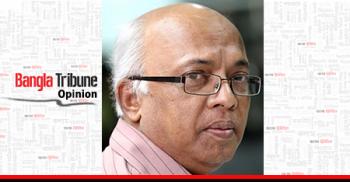 Abul Maal Abdul Muhith has always been a lovable man. There is something of the gregarious in him, a spontaneity of friendliness you hardly come across in any other superannuated bureaucrat or present-day politician. There is then the humility which you cannot miss. In a society where pretensions run deep and pretence is generally the norm in social behaviour, Muhith is that rare personality who makes you feel at ease in his presence. His remarks to the media on the issues which this nation is confronted with are those you may not always or fully agree with, but you can be sure they come from somewhere deep inside him.
Abul Maal Abdul Muhith has always been a lovable man. There is something of the gregarious in him, a spontaneity of friendliness you hardly come across in any other superannuated bureaucrat or present-day politician. There is then the humility which you cannot miss. In a society where pretensions run deep and pretence is generally the norm in social behaviour, Muhith is that rare personality who makes you feel at ease in his presence. His remarks to the media on the issues which this nation is confronted with are those you may not always or fully agree with, but you can be sure they come from somewhere deep inside him.
And because there are these admirable qualities in Muhith, who by the way is a very readable writer on crucial aspects of Bangladesh’s history, it is something of a surprise hearing him use the word ‘rubbish’ in his assessment of certain situations. You are surprised, but, more properly, you observe the ‘naturalness’ in him. It is then that you tend to reflect on the use of the English language itself, on the nuances of the words and phrases that you are confronted with almost on a regular basis.
And that reminds us of Edward Heath. No, the late British politician did not employ ‘rubbish’ in his public pronouncements. But he did use the word ‘rejoice’ three times when news came in of Margaret Thatcher’s fall from power. So here you have a situation of Muhith using, in righteous indignation, the term ‘rubbish’ three times at one point and Heath, in celebration, crowing through making use of the word ‘rejoice’ three times.
The English language, in the hands of politicians, generally opens up a passage to the heights of oratorical charm. Then again, there are the times when it can reveal some of those dark instincts in men we thought did not exist. As the various layers of Watergate unfolded before him, Richard Nixon went before the media and told Americans, with not a blink in the eye, ‘I am not a crook’. That turned out to be the most damning understatement of his career, for only months later it was his proven crookedness which pushed him out of the White House. It was a kind of remark that would in later times be replicated, almost, by Bill Clinton. He wagged his finger, looked stern and told Americans he did not have sex ‘with that woman’ (read Monica Lewinsky here). Ah, but he did. For as long as people remember Nixon and Clinton, they will remember these two statements they made. These have become part of historical memory.
In his times, Joseph Stalin made sure that no one could so much as hint at opposition to him. He sent numerous comrades of his to the firing squad in what we today know as the purges. Stalin’s word was law, almost divine. But then there were those rare men, like Yugoslavia’s Josip Broz Tito, who cared little for Stalin’s imprecations. The Soviet leader once told the world, pompously, that he would shake his little finger and Tito would be gone. Stalin died in 1953. Tito would live till 1980, as president of Yugoslavia. In China, Deng Xiao-ping’s theory of cats and mice landed him in steaming hot water in Maoist times. It did not matter, proclaimed the diminutive Deng, whether a cat was black or white as long as it caught mice. Well, it did matter. For Mao, Deng was a capitalist roader. Such a man was to be punished. Deng paid the price.
In a way, Morarji Desai too paid a price for his indiscreet description, in Hindi, of the young Indira Gandhi as a chhokri (a mere slip of a girl) when in 1966 the Congress syndicate decided that Nehru’s daughter would succeed Lal Bahadur Shastri as prime minister. It would be a very long time before the cantankerous, urine-imbibing Desai would become prime minister, only to last a moment in historical time. Indira Gandhi was the target of other indecencies as well.
Pakistan’s Yahya Khan, outmanoeuvred by the Indian leader in 1971, warned ‘that woman’ against any precipitate action aimed at his country. It was of little use. Mrs Gandhi saw to it that East Pakistan became Bangladesh and then, in magnanimity, stopped her army from destroying what remained of Pakistan in the west. ZA Bhutto needlessly denigrated Indira Gandhi at his public rallies through calling her ‘mai’, a pejorative term for ‘woman’. In 1972, he went with folded palms to Simla, to negotiate a peace deal with the Indian leader.
There are public figures who will be remembered for the language they used at some point or another in their careers. Bhutto once told anyone who would listen that Pakistanis would eat grass but would have the atom bomb. Well, Pakistan has the bomb, per courtesy of the theft committed by AQ Khan. But its people still wallow in gross poverty. And eating grass is a difficult proposition. In Bangladesh, our first military dictator Ziaur Rahman thought money was no problem as he went about directing ‘development work.’ He said he would make politics difficult. His party, in power, had its cronies make a lot of money. Out of power, it did not let parliament work. The Zia legacy?
Which reminds you of another legacy. Mohammad Ali Jinnah did all he could to dismember India, for Pakistan to take form. He succeeded. And then he told the Bengalis of his country that they had to speak Urdu. That was how he set Pakistan on the road to disintegration. Time was when Rajiv Gandhi thought Calcutta was falling apart. He called it a dying city. Well, Calcutta is now Kolkata. It thrives still.
Ah, well ...
Syed Badrul Ahsan is the Editor-in-Charge at The Asian Age.


